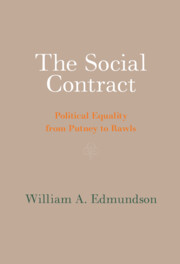Refine search
Actions for selected content:
242 results
Chapter 13 - Promissory Notes and Other Forms of Consent
- from Part I - Storying-to-Learn: How Stories-that-Matter Help Us Appreciate Social Work in Action
-
-
- Book:
- Learning through Social Work Stories-That-Matter
- Published online:
- 28 August 2025
- Print publication:
- 11 September 2025, pp 178-193
-
- Chapter
- Export citation
Chapter 11 - More Revolutions, Chartism, and the Ascent of Utilitarianism
-
- Book:
- The Social Contract
- Published online:
- 30 May 2025
- Print publication:
- 04 September 2025, pp 128-140
-
- Chapter
- Export citation
Positive reciprocity when motives are ambiguous
-
- Journal:
- Experimental Economics ,
- Published online by Cambridge University Press:
- 14 August 2025, pp. 1-24
-
- Article
-
- You have access
- Open access
- HTML
- Export citation
Money burning is driven by reciprocity rather than spite
-
- Journal:
- Journal of the Economic Science Association ,
- Published online by Cambridge University Press:
- 23 July 2025, pp. 1-11
-
- Article
-
- You have access
- Open access
- HTML
- Export citation
9 - Sermons on Feasts of the Martyrs
- from Part II - Augustine’s Sermons on the Scriptures and Liturgical Feasts
-
-
- Book:
- The Cambridge Companion to Augustine's Sermons
- Published online:
- 26 May 2025
- Print publication:
- 12 June 2025, pp 169-190
-
- Chapter
- Export citation

The Social Contract
- Political Equality from Putney to Rawls
-
- Published online:
- 30 May 2025
- Print publication:
- 04 September 2025
Enforcing Singapore Judgments in Cambodia: Reciprocity Under the Loupe
-
- Journal:
- Asian Journal of International Law / Volume 15 / Issue 2 / July 2025
- Published online by Cambridge University Press:
- 09 April 2025, pp. 252-280
- Print publication:
- July 2025
-
- Article
-
- You have access
- Open access
- HTML
- Export citation
Competition for talent: heterogenous abilities in team production
-
- Journal:
- Experimental Economics / Volume 27 / Issue 5 / November 2024
- Published online by Cambridge University Press:
- 02 April 2025, pp. 1033-1067
-
- Article
- Export citation
Implications of trust, fear, and reciprocity for modeling economic behavior
-
- Journal:
- Experimental Economics / Volume 11 / Issue 1 / March 2008
- Published online by Cambridge University Press:
- 14 March 2025, pp. 1-24
-
- Article
- Export citation
Deception and reciprocity
-
- Journal:
- Experimental Economics / Volume 22 / Issue 4 / December 2019
- Published online by Cambridge University Press:
- 14 March 2025, pp. 980-1001
-
- Article
-
- You have access
- Open access
- HTML
- Export citation
Estimating the causal effect of beliefs on contributions in repeated public good games
-
- Journal:
- Experimental Economics / Volume 16 / Issue 3 / September 2013
- Published online by Cambridge University Press:
- 14 March 2025, pp. 414-425
-
- Article
- Export citation
Decomposing Trust and Trustworthiness
-
- Journal:
- Experimental Economics / Volume 9 / Issue 3 / September 2006
- Published online by Cambridge University Press:
- 14 March 2025, pp. 193-208
-
- Article
- Export citation
The effect of random shocks on reciprocal behavior in dynamic principal-agent settings
-
- Journal:
- Experimental Economics / Volume 26 / Issue 2 / April 2023
- Published online by Cambridge University Press:
- 14 March 2025, pp. 468-488
-
- Article
-
- You have access
- Open access
- HTML
- Export citation
Status quo effects in fairness games: reciprocal responses to acts of commission versus acts of omission
-
- Journal:
- Experimental Economics / Volume 20 / Issue 1 / March 2017
- Published online by Cambridge University Press:
- 14 March 2025, pp. 1-18
-
- Article
- Export citation
Control Without Deception: Individual Behaviour in Free-Riding Experiments Revisited
-
- Journal:
- Experimental Economics / Volume 3 / Issue 3 / December 2000
- Published online by Cambridge University Press:
- 14 March 2025, pp. 215-240
-
- Article
- Export citation
Measuring Motivations for the Reciprocal Responses Observed in a Simple Dilemma Game
-
- Journal:
- Experimental Economics / Volume 1 / Issue 3 / December 1998
- Published online by Cambridge University Press:
- 14 March 2025, pp. 207-219
-
- Article
- Export citation
Learning to Punish: Experimental Evidence from a Sequential Step-Level Public Goods Game
-
- Journal:
- Experimental Economics / Volume 5 / Issue 1 / June 2002
- Published online by Cambridge University Press:
- 14 March 2025, pp. 39-51
-
- Article
- Export citation
Why did he do that? Using counterfactuals to study the effect of intentions in extensive form games
-
- Journal:
- Experimental Economics / Volume 21 / Issue 1 / March 2018
- Published online by Cambridge University Press:
- 14 March 2025, pp. 1-26
-
- Article
- Export citation
Efficient Contracting and Fair Play in a Simple Principal-Agent Experiment
-
- Journal:
- Experimental Economics / Volume 5 / Issue 1 / June 2002
- Published online by Cambridge University Press:
- 14 March 2025, pp. 5-27
-
- Article
- Export citation
Peer pressure, social spillovers, and reciprocity: an experimental analysis
-
- Journal:
- Experimental Economics / Volume 14 / Issue 2 / May 2011
- Published online by Cambridge University Press:
- 14 March 2025, pp. 203-222
-
- Article
- Export citation
